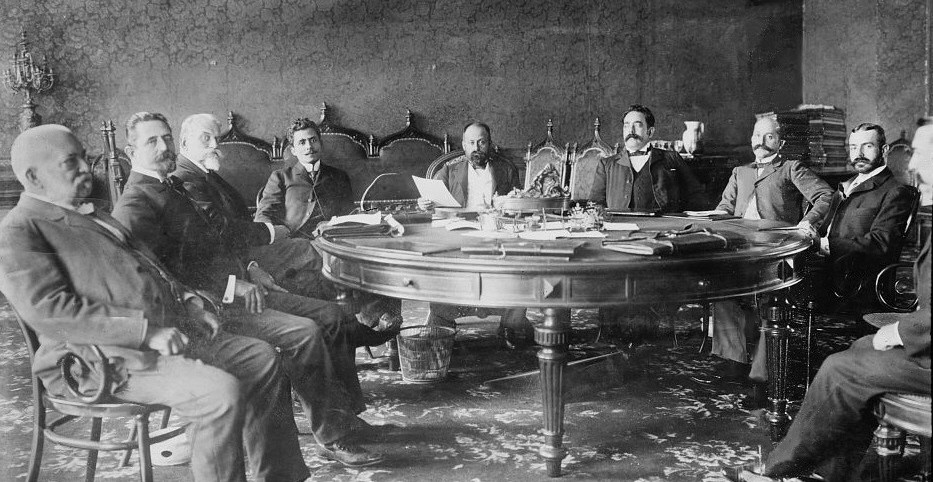|
Cipriano Castro
José Cipriano Castro Ruiz (12 October 1858 – 4 December 1924) was a high-ranking member of the Venezuelan military, politician and the president of Venezuela from 1899 to 1908. He was the first man from the Andes to rule the country, and was the first of four military strongmen from the Andean state of Táchira to rule the country over the next 46 years. Early life Cipriano Castro was the son of José Carmen Castro and Pelagia Ruiz. He was born on 12 October 1858 in Capacho, Táchira. Castro's father was a mid-level farmer and he received an education typical of the tachirense middle-class. His family had significant mercantile and family relations with Colombia, in particular with Cúcuta and Puerto Santander. After studying in his native town and the city of San Cristóbal, he continued his studies at a seminary school in Pamplona, Colombia (1872–1873). He left those studies to return to San Cristóbal, where he began work as employee of a company called Van Dissel ... [...More Info...] [...Related Items...] OR: [Wikipedia] [Google] [Baidu] |
President Of Venezuela
The president of Venezuela ( es, Presidente de Venezuela), officially known as the President of the Bolivarian Republic of Venezuela ( es, Presidente de la República Bolivariana de Venezuela), is the head of state and head of government in Venezuela. The president leads the National Executive of the Venezuelan government and is the commander-in-chief of the National Bolivarian Armed Forces. Presidential terms were set at six years with the adoption of the 1999 Constitution of Venezuela, and presidential term limits were removed in 2009. The office of president in Venezuela has existed since the 1811 Venezuelan Declaration of Independence from the Spanish Crown; the first president was Cristóbal Mendoza. From 1821 to 1830, Venezuela was a member state of Gran Colombia, and the Venezuelan executive was absorbed by the Colombian government in Bogotá. When the State of Venezuela became independent from Gran Colombia, the office of the president was restored under José A ... [...More Info...] [...Related Items...] OR: [Wikipedia] [Google] [Baidu] |
Pamplona, Colombia
Pamplona (pronounced ) is a municipality and city in Norte de Santander, Colombia. It is also the fifth most populated municipality in the department. History Colonization The town was founded on 1 November 1549 as Nueva Pamplona del Valle del Espíritu Santo, named after the capital of the Kingdom of Navarre, Crown of Castile, by Pedro de Ursúa and Ortún Velasco de Velázquez. From there, the expeditions departed which founded the towns of Mérida, San Cristóbal and La Grita, in the Republic of Venezuela, and Ocaña, Salazar de las Palmas, Chinácota, San Faustino, Bucaramanga and Cúcuta in Colombia, among others. The natives, called by the Spanish, were the first inhabitants of the old Province of Pamplona. They received the name because of the men had a custom of carrying a or (gourd) hanging from the waist, with ''chicha'' or maize wine as the Spaniards called it. Asked for the name of what they were carrying, the natives responded that it was a . When the area ... [...More Info...] [...Related Items...] OR: [Wikipedia] [Google] [Baidu] |
Santa Ana De Coro
Coro, historically known as Neu-Augsburg, is the capital of Falcón State and the second oldest city of Venezuela (after Cumaná). It was founded on July 26, 1527, by Juan de Ampíes as Santa Ana de Coro. It is established at the south of the Paraguaná Peninsula in a coastal plain, flanked by the Médanos de Coro National Park to the north and the Sierra de Coro to the south, at a few kilometers from its port ( La Vela de Coro) in the Caribbean Sea at a point equidistant between the Ensenada de La Vela and Golfete de Coro. It has a wide cultural tradition that comes from being the urban settlement founded by the Spanish conquerors who colonized the interior of the continent. It was the first capital of the Venezuela Province and head of the first bishop founded in South America in 1531. As Neu-Augsburg, it was the first German colony in the Americas under the Welser family of Augsburg. The precursor movement of the independence and of vindication of the dominated classes ... [...More Info...] [...Related Items...] OR: [Wikipedia] [Google] [Baidu] |
Krupp
The Krupp family (see pronunciation), a prominent 400-year-old German dynasty from Essen, is notable for its production of steel, artillery, ammunition and other armaments. The family business, known as Friedrich Krupp AG (Friedrich Krupp AG Hoesch-Krupp after acquiring Hoesch AG in 1991 and lasting until 1999), was the largest company in Europe at the beginning of the 20th century, and was the premier weapons manufacturer for Germany in both world wars. Starting from the Thirty Years' War until the end of the Second World War, it produced battleships, U-boats, tanks, howitzers, guns, utilities, and hundreds of other commodities. The dynasty began in 1587 when trader Arndt Krupp moved to Essen and joined the merchants' guild. He bought and sold real estate, and became one of the city's richest men. His descendants produced small guns during the Thirty Years' War and eventually acquired fulling mills, coal mines and an iron forge. During the Napoleonic Wars, Friedrich ... [...More Info...] [...Related Items...] OR: [Wikipedia] [Google] [Baidu] |
Orinoco Shipping Company
The Orinoco () is one of the longest rivers in South America at . Its drainage basin, sometimes known as the Orinoquia, covers , with 76.3 percent of it in Venezuela and the remainder in Colombia. It is the fourth largest river in the world by discharge volume of water. The Orinoco River and its tributaries are the major transportation system for eastern and interior Venezuela and the Llanos of Colombia. The environment and wildlife in the Orinoco's basin are extremely diverse. Etymology The river's name is derived from the Warao term for "a place to paddle", itself derived from the terms ''güiri'' (paddle) and ''noko'' (place) i.e. a navigable place. History The mouth of the Orinoco River at the Atlantic Ocean was documented by Christopher Columbus on 1 August 1498, during his third voyage. Its source at the Cerro Delgado–Chalbaud, in the Parima range, was not explored until 453 years later, in 1951. The source, near the Venezuelan–Brazilian border, at a ... [...More Info...] [...Related Items...] OR: [Wikipedia] [Google] [Baidu] |
Lake Bermudez
Lake Guanoco (Spanish: ''Lago Guanoco'' or ''Lago de Asfalto de Guanoco'', also Lake Bermudez) is the world's second largest natural tar pit and lies in Venezuela in northern South America. Lake Guanoco is one of the five natural asphalt lake areas in the world, the others being Pitch Lake in Trinidad and Tobago and La Brea Tar Pits (Los Angeles), McKittrick Tar Pits ( McKittrick) and Carpinteria Tar Pits (Carpinteria) all located in the US state of California., National Library and Information System Authority, National Library of Trinidad and Tobago, accessdate=2010-08-28 Electric Universe Geology.com, accessdate=2010-08-28 [...More Info...] [...Related Items...] OR: [Wikipedia] [Google] [Baidu] |
Liberating Revolution (Venezuela)
The Liberating Revolution was a civil war in Venezuela between 1901 and 1903 in which a coalition of regional caudillos led by the banker Manuel Antonio Matos tried to overthrow the government of Cipriano Castro.Irwin & Micett, 2008: 164 Background Castro himself had come to power in 1899 after winning another civil war, the Restorative Liberal Revolution, in which he overthrew the constitutional president Ignacio Andrade, establishing a government called the ''Restaurador''. Since then, the new government dedicated itself to initiating a centralist project, canceling the external debt, modernizing the armed forces and allied itself with the most influential caudillos in the country, but thereby weakening many others. To do this, he used the system of alliances created by Antonio Guzmán Blanco to impose central government officials in each of the country's regions. Given this, many caudillos found themselves in the dilemma of, on the one hand, supporting the uprising or r ... [...More Info...] [...Related Items...] OR: [Wikipedia] [Google] [Baidu] |
Manuel Antonio Matos
Manuel Antonio Matos Páez Tinoco (8 January 1847 – 5 December 1929) was a Venezuelan politician, banker, military leader and diplomat. Biography Matos held a great political and economic influence on the country, during the late 19th and early 20th centuries, having an extraordinary prestige and power in the banking and business fields. In addition to having various investments and influence over foreign and transnational companies operating in Venezuela, held a variety of positions in banking and disposing of what is estimated to be the greatest fortune in the history of Venezuela and of Latin America.Banko, Catalina (2002) ''"Manuel Antonio Matos". Biblioteca Biográfica Venezolana''. Editorial El Nacional. Caracas, Venezuela.Amaro Arias, Alberto 2000:''Historia de la República Bolivariana de Venezuela'' A major figure of the political current denominated ''Liberalismo Amarillo'', he served 3 times as Minister of Finance (1892, 1895 and 1898), besides being the most powerfu ... [...More Info...] [...Related Items...] OR: [Wikipedia] [Google] [Baidu] |
Edwin Lieuwen
Edwin Lieuwen (February 8, 1923 – May 25, 1988) was an American historian, professor, and author. His area of expertise was focused on Latin America. His work was a major precursor to the establishing of the Latin American Institute. Early life and education Born in Harrison, South Dakota on February 8, 1923, he attended the University of California, Berkeley and graduated in 1951 with a PhD. He then received a Fulbright lectureship to attend the University of Utrecht in the Netherlands. Career After his return from the Netherlands, he worked for three years as a policy analyst at the United States State Department for three years. In 1957 he was appointed as chairman to the history department as the University of New Mexico. Lieuwen found himself in an academic circle that included France Vinton Scholes as the authority on Latin American studies. His work established the Latin American studies program which would later become the Latin American Institute. He wrote for ... [...More Info...] [...Related Items...] OR: [Wikipedia] [Google] [Baidu] |
Elihu Root
Elihu Root (; February 15, 1845February 7, 1937) was an American lawyer, Republican politician, and statesman who served as Secretary of State and Secretary of War in the early twentieth century. He also served as United States Senator from New York and received the 1912 Nobel Peace Prize. Root is sometimes considered the prototype of the 20th century political " wise man," advising presidents on a range of foreign and domestic issues. Root was a leading New York City lawyer who moved frequently between high-level appointed government positions in Washington, D.C., and private-sector legal practice in New York City. His private clients included major corporations and such powerful players as Andrew Carnegie. Root served as president or chairman of the Carnegie Endowment for International Peace, the Carnegie Institution of Washington, and the Carnegie Corporation of New York. Root was a prominent opponent of women's suffrage and worked to ensure the New York state constitut ... [...More Info...] [...Related Items...] OR: [Wikipedia] [Google] [Baidu] |
Gómez And Cipriano Castro
Gómez (frequently anglicized as Gomez) is a common Spanish patronymic surname meaning "son of Gome". The Portuguese and Old Galician version is Gomes, while the Catalan form is Gomis. The given name ''Gome'' is derived from the Visigothic word ''guma'', "man", with multiple Germanic cognates with the same meaning (Old English ''guma'', Middle English ''gome'')/''gomo'' High Old German ''gomo'', Middle High German ''gome''), which are related to Latin ''homo'', "man".Duden, ''Das Herkunftswörterbuch: Etymologie der deutschen Sprache'' (in German), Band 7, Duden Verlag 1989. p. 96. ''Bräutigam''. __NOTOC__ People Notable people with the surname include: A–E * Alejandro "Papu" Gómez (born 1988), Argentine footballer * Amaranta Gómez Regalado (born 1977), Mexican anthropologist * Ana Sofía Gómez (born 1995), Guatemalan artistic gymnast * Andrés Gómez (born 1960), Ecuadorian tennis player * Arthur Gómez (born 1984), Gambian footballer * Beatrice Luigi Gomez (born 1995), ... [...More Info...] [...Related Items...] OR: [Wikipedia] [Google] [Baidu] |




